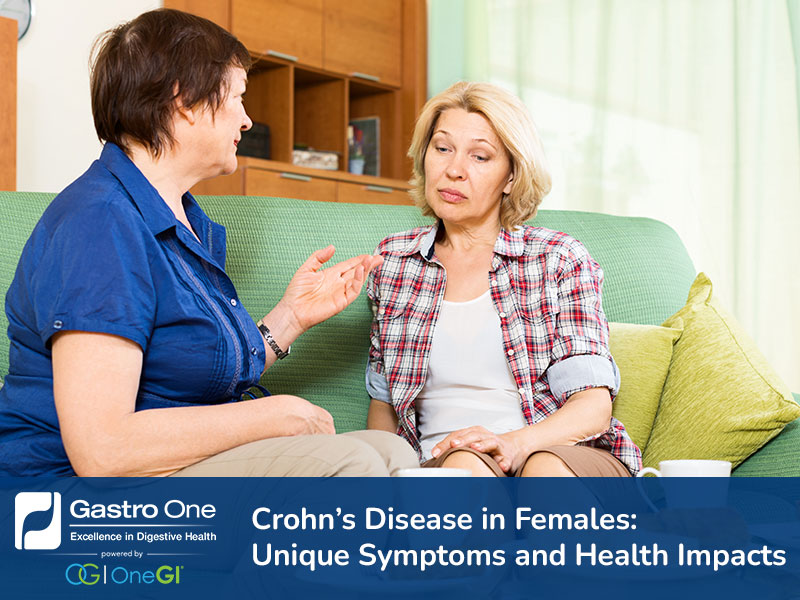
Women with Crohn’s disease face unique challenges beyond the typical digestive symptoms. Understanding these female-specific symptoms helps you recognize when to seek treatment and manage your condition more effectively.
Crohn’s disease affects men and women equally, but women experience additional symptoms related to their reproductive health. These symptoms stem from how chronic inflammation interferes with hormone production and nutrient absorption in the female body.
Table of Contents
Unique Crohn’s Disease Symptoms in Females
Irregular and Painful Periods
Digestive inflammation disrupts your body’s ability to absorb essential nutrients. This malabsorption, combined with chronic inflammation, affects hormone levels and menstrual cycle regularity.
Women with active Crohn’s disease often experience:
- Unpredictable cycle lengths
- Severe menstrual cramps
- Heavy bleeding
- Missed periods during flare-ups
Stress from managing chronic illness also contributes to hormonal imbalances that worsen menstrual irregularities.
Anemia
Iron deficiency anemia occurs frequently in women with Crohn’s disease for multiple reasons:
- Chronic intestinal bleeding depletes iron levels
- Inflamed intestines absorb iron poorly
- Heavy menstrual periods increase iron loss
Anemia symptoms include persistent fatigue, dizziness, trouble concentrating, and pale skin. Women need regular blood tests to monitor iron levels and prevent severe anemia complications.
Osteoporosis Risk
Women already face higher osteoporosis risk than men. Crohn’s disease increases this risk through several mechanisms:
- Chronic inflammation releases proteins that slow bone formation
- Corticosteroid medications weaken bones over time
- Poor nutrient absorption leads to calcium and vitamin D deficiencies
- Fatigue reduces weight-bearing exercise
Early bone density screening helps prevent fractures and guides treatment decisions.
Reduced Fertility
Active Crohn’s disease temporarily reduces fertility through inflammation affecting reproductive organs. Research shows that women with active disease experience:
- Disrupted ovulation cycles
- Inflamed fallopian tubes and ovaries
- Hormonal imbalances preventing conception
Fertility typically returns to normal levels when the disease enters remission with proper treatment.
Painful Intercourse
Women with Crohn’s disease may experience dyspareunia (painful sex) due to:
- Active inflammation near the rectum or vagina
- Rectovaginal fistulas creating abnormal connections between organs
- Scar tissue from previous surgeries
Fistulas require immediate medical attention as they increase infection risk and cause significant discomfort.
Health Impacts and Complications
Pregnancy Considerations
Women with Crohn’s disease should plan pregnancies carefully. The best outcomes occur when the disease remains in remission for 3-6 months before conception.
Active disease during pregnancy increases risks of:
- Miscarriage
- Premature delivery
- Low birth weight babies
- Pregnancy complications
Most Crohn’s medications remain safe during pregnancy, but discuss all treatments with your gastroenterologist and obstetrician before conceiving.
Puberty and Menstruation Effects
Girls diagnosed with Crohn’s disease before puberty may experience delayed development. Poor nutrition and chronic inflammation interfere with growth hormones necessary for normal puberty.
- Factors affecting pubertal development include:
- Inadequate calorie intake
- Nutrient malabsorption
- Chronic stress from illness
- Decreased growth hormone production
Early diagnosis and aggressive treatment help ensure normal growth and development.
Intimacy and Contraception Considerations
Crohn’s disease affects contraceptive choices. Estrogen-containing birth control pills increase blood clot risk in women with inflammatory conditions. Intrauterine devices (IUDs) provide safer, effective contraception for most women with Crohn’s disease.
Open communication with partners about symptoms, energy levels, and physical limitations helps maintain healthy relationships during difficult periods.
Dietary and Lifestyle Management
General Dietary Recommendations
No single diet works for everyone with Crohn’s disease, but certain principles help most women manage symptoms:
- Track food triggers with a detailed diary
- Eat smaller, frequent meals
- Stay hydrated with water and electrolyte solutions
- Limit high-fiber foods during flare-ups
- Choose easily digestible proteins
Work with a registered dietitian experienced in inflammatory bowel disease for personalized meal planning.
The Role of Nutrition
Proper nutrition becomes critical for women with Crohn’s disease due to increased nutrient needs. Focus on:
- Iron-rich foods to prevent anemia
- Calcium and vitamin D for bone health
- Folate before and during pregnancy
- B12 supplements if absorption is impaired
Prenatal vitamins benefit women of childbearing age even when not pregnant, as they provide essential nutrients often depleted by Crohn’s disease.
Crohn’s Disease Treatment Options
Medication Management
Crohn’s disease treatment plans vary based on disease severity and location. Common medications include:
- Aminosalicylates for mild inflammation
- Immunomodulators for long-term control
- Biologics for moderate to severe disease
- Corticosteroids for short-term flare management
Discuss medication safety during pregnancy and breastfeeding with your healthcare team.
Surgical Interventions
Surgery becomes necessary when medications fail to control symptoms or complications develop. Women may need surgery for:
- Intestinal blockages
- Fistulas or abscesses
- Severe bleeding
- Medication-resistant disease
Post-surgical recovery affects fertility temporarily, but most women resume normal reproductive function after healing.
Taking Action for Better Health
Early diagnosis and consistent treatment are key for managing Crohn’s disease in women. Regular monitoring, including blood tests, bone density scans, and gynecological exams, helps prevent complications and manage Crohn’s disease symptoms in females. Work with a healthcare team to address both digestive and reproductive health. With proper management, women with Crohn’s can lead full lives. Schedule an appointment with a specialist to ensure early intervention and better long-term outcomes.



